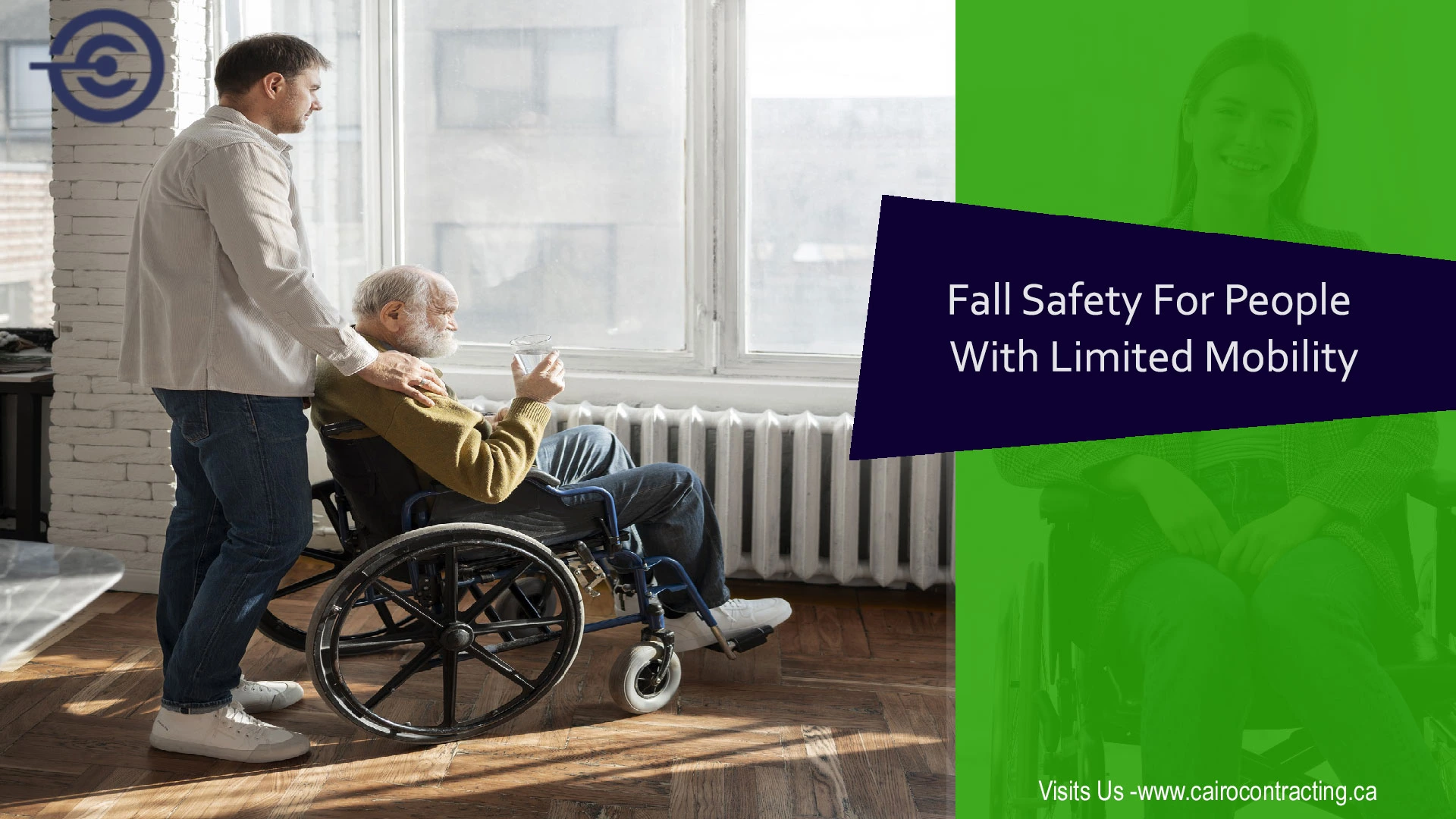Fall safety is especially important for individuals with limited mobility because they may be at a higher risk of injury if a fall occurs. Here are some practical tips and strategies to help prevent falls and improve safety for people with limited mobility:

1. Improve Home Safety
- Remove Trip Hazards: Ensure floors are clear of clutter, cords, or rugs that could cause tripping. Consider securing rugs with non-slip backing or removing them altogether.
- Use Non-Slip Mats: Place non-slip mats or adhesive strips in bathrooms, kitchens, and other high-risk areas to prevent slipping on wet floors.
- Ensure Proper Lighting: Make sure that hallways, stairs, and rooms are well-lit to avoid accidents, especially during the night.
- Install Handrails: Place handrails/ grab bars on both sides of stairs, in bathrooms, and near any areas where extra support is needed. Grab bars in bathrooms can provide additional stability.
2. Accessibility Solutions for Mobility
- Use Proper Mobility Devices: Ensure that walkers, canes, or wheelchairs are the right fit and are used properly. If necessary, consult with a healthcare professional to ensure mobility aids are safe and effective for the individual’s specific needs.
- Check Wheelchairs and Walkers: Ensure that any wheelchair or walker is in good working condition. Regularly check for any loose parts or damaged components.
- Wheelchair Ramps for Mobility: Wheelchair ramps are a good option for outdoors to navigate the stairs securely and safely.
3. Physical Therapy and Exercise
- Strengthen Muscles and Improve Balance: Regular physical therapy or exercises aimed at improving strength and balance can reduce the likelihood of a fall. Activities such as chair exercises or tai chi can enhance coordination and stability.
- Work on Flexibility: Stretching exercises can help maintain or improve flexibility, which aids in balance and mobility.
4. Footwear
- Wear Proper Shoes: Supportive, non-slip shoes are essential. Avoid slippers or shoes that are too loose or have smooth soles, as they can increase the risk of slipping.
- Avoid Bare Feet: Walking barefoot can increase the risk of tripping or falling, especially on slick floors.
5. Assistive Technology
- Consider Fall Detection Devices: Wearable devices, such as medical alert systems with fall detection, can be helpful in alerting someone in case of a fall. Some smart devices can notify family members or emergency services automatically.
- Install Smart Lighting: Smart lights that automatically turn on when movement is detected can help avoid accidents, particularly at night are one of the most recommended accessibility solutions.
6. Medication Management
- Review Medications: Certain medications can affect balance, alertness, and coordination. Make sure to regularly review medications with a healthcare provider, especially if there are any side effects that could contribute to an increased risk of falling.
7. Maintain Regular Medical Checkups
- Vision and Hearing: Ensure that vision and hearing are regularly checked. Poor vision or hearing can contribute to falls, as individuals may not be able to detect obstacles or changes in their environment.
- Bone and Joint Health: Conditions like osteoporosis can increase the risk of fractures if a fall does occur. Regular checkups with healthcare professionals can help manage such conditions. Wheelchair ramps or stairlifts for mobility are recommended options for accessibility solutions to improve bone and joint health.
8. Social Support and Supervision
- Buddy System: Having someone around who can offer assistance or supervision when needed can be helpful for those with limited mobility, especially during activities that might involve walking or standing for extended periods.
- Emergency Plan: Make sure the individual has a way to call for help in an emergency, such as having a phone nearby or a personal alert system.
By taking these measures, people with limited mobility can reduce the risk of falling and feel more confident in their daily activities. Each person’s situation may be different, so it’s important to tailor these strategies to individual needs. Call Cairo Contracting today to book your FREE Home-Assessment. Their professionals are experts to offer you the best consultation on how to make your home safe with cost-effective accessibility solutions.